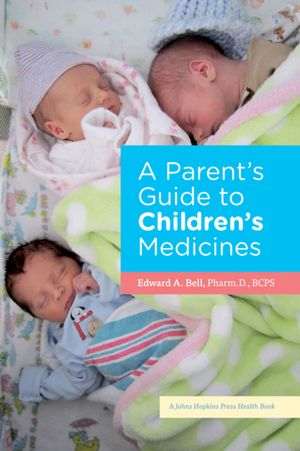 Author: Edward A. Bell, Pharm.D, BCPS
Author: Edward A. Bell, Pharm.D, BCPS
Publisher: Johns Hopkins University Press
Book Review by: Laxmi Chaandi
This compact, 166-page book on medicines for children is an easy-to-use and very useful one written in plain language that answers commonly-asked questions such as: should I give certain medicines to my child and what are the benefits and side effects of each one; how should I administer them; what are the different medicines for common illnesses such as asthma, diarrhea, headaches, and others; how do I use medicines for fever and infections; and what vaccines are essential in protecting my child and which ones are not?
The author Edward A. Bell is a pediatric pharmacist – just the rightly qualified person to write a book on this subject. He is a professor of clinical sciences at the College of Pharmacy and Health Sciences at Drake University and the Blank Children’s Hospital and Clinical Sciences in Des Moines, Iowa. He authors a monthly column on children’s medicines in the journal Infectious Diseases in Children.
Among the useful items of information you will find in this handy reference work are not only answers to your frequently-asked questions on medicines for children but also directions on giving medicines to your child orally, and in the ear, eye and nose; how to measure, flavor and administer liquid medicines; and descriptions of specific medicines for common illnesses, fever and different types of infections.
In the book’s seven chapters, you will find discussions on many topics that concern you but you have not looked up anywhere to learn more about, such as how to reduce your child’s anxiety about and pain from an injection. You will also come across subjects you probably did not think about, such as the side effects of some medicines being different in children than in adults.
Oftentimes, you may encounter resistance from your child on taking certain bitter-tasting medicines, but you have no idea on how to overcome this problem. Also, when your child’s fever does not go away despite giving medicine to him or her, you are scared about it, but are unaware what temperature level is dangerous. This book has the answers.
Children often get cuts or scrape their limbs from playing and if untreated, can get infections that could lead to diseases. What antibiotic to use? An inflamed spot on the skin, a sore throat, and an upset stomach are symptoms of different types of infections that require different antibiotics. Find out from the book what they are.
Parents have concerns and fears about vaccines. This book describes what vaccines are made of, how different types of them work and how to decide which ones necessary and recommended for your child. You will also get answers to questions such as: do vaccines have mercury in them? and: Is mercury dangerous? And do vaccines cause autism?
This book also points out more information sources on children’s medicines such as other good books and medical websites. It also lays out questions you should ask your child’s doctor and your pharmacist. There are appendices at the end of the book that contain information on: using expired medicines in some cases; taking medications while breast–feeding; essential steps to poison prevention; and how you should give medicine to your child orally, in the ear, eye and nose.
This is a must-have book for parents with children and it can be a life-saving one. Edward A. Bell provides a lot of information, knowledge and insight and he has organized all that in a simple question-and-answer format through seven well-written chapters, plus appendices, references and an index for you to quickly go to a given topic.






